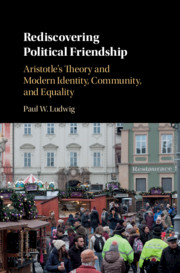Book contents
- Rediscovering Political Friendship
- Rediscovering Political Friendship
- Copyright page
- Dedication
- Epigraph
- Contents
- Preface and Acknowledgments
- Introduction
- Part I Foundations of Friendship
- 1 Friendship from Identity
- 2 Friendships from Utility and Activity
- Part II Where Is Civic Friendship Today?
- Part III A Different Way to View Liberalism
- Part IV Conclusion
- Works Cited
- Index
1 - Friendship from Identity
Recognizing Anger in the Politics of Recognition
from Part I - Foundations of Friendship
Published online by Cambridge University Press: 12 December 2019
- Rediscovering Political Friendship
- Rediscovering Political Friendship
- Copyright page
- Dedication
- Epigraph
- Contents
- Preface and Acknowledgments
- Introduction
- Part I Foundations of Friendship
- 1 Friendship from Identity
- 2 Friendships from Utility and Activity
- Part II Where Is Civic Friendship Today?
- Part III A Different Way to View Liberalism
- Part IV Conclusion
- Works Cited
- Index
Summary
In Aristotle’s Politics, friendly passion is an identification stemming from anger and self-assertion: the zero-sum competition for honors could become win-win only among civic friends. The liberal solution to the problem, found in Madison’s Federalist 10, was to “extend the sphere” and multiply “the interests,” transforming identity groups into interest groups: a win-win economic competition. This solution was so successful that subsequent theorists forgot about the underlying anger and self-assertion. For example, we live today with the terrible effects of political theorists’ endorsement of identity politics, starting with Charles Taylor’s misreading of Hegel’s “Lordship and Bondage,” which blinded a generation of theorists. Seeking a healthier identity in vocations, rather than race or culture, might solve the conundrum of our desiring both equality and superiority. To excel at a vocation is to achieve a superiority that generates a new form of equality: reciprocity. In reciprocal exchange, what I am good at is balanced by what you are good at. Civic friendship is a humane way of returning to this liberal solution without forgetting the inhumane passions on which it is based.
Keywords
- Type
- Chapter
- Information
- Rediscovering Political FriendshipAristotle's Theory and Modern Identity, Community, and Equality, pp. 25 - 71Publisher: Cambridge University PressPrint publication year: 2020

